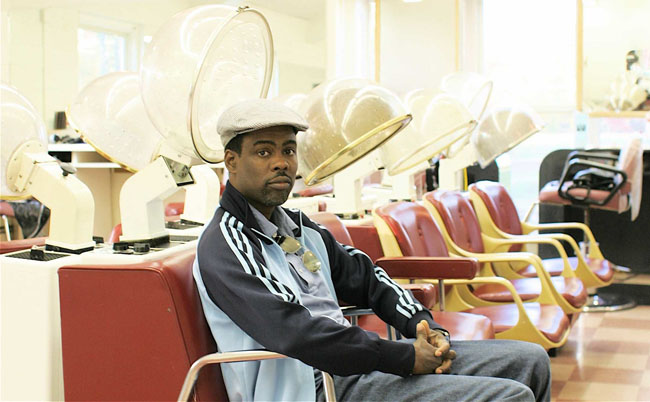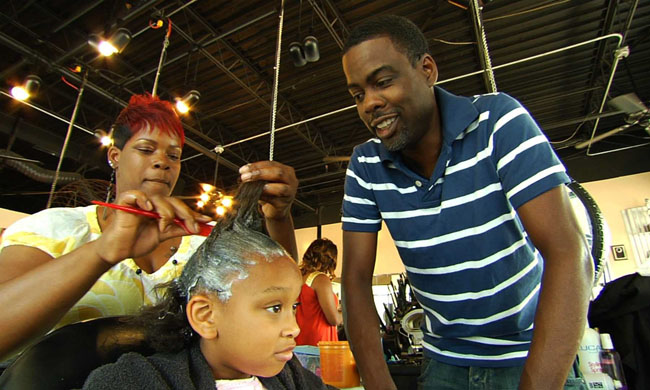CHICAGO – In anticipation of the scariest week of the year, HollywoodChicago.com launches its 2024 Movie Gifts series, which will suggest DVDs and collections for holiday giving.
‘Good Hair’ Has Chris Rock Getting to the Roots of Follicle Follies
 Rating: 3.5/5.0 |
CHICAGO – Positioning himself as a informational bridge-builder, comedian Chris Rock explores the often complex social economics of African American hair, specifically the intense styling that is a borderline obsession for women of color.
Traveling virtually throughout the world, Rock witnesses the channels of commerce, politics and even religious overtones in relationship to African American women (and to a lesser degree black men and all women) and their coiffure.
 Photo credit: © 2009 Roadside Attractions |
Using a black hair stylist’s convention as a centerpiece for the documentary, Rock plays the unbelieving observer as he goes from booth to booth at the convention. The highlight of the gathering is an elaborate presentation of stylists who put on broadway-style or hip hop shows with themes that communicate the technique variations of participating rock-star-like hair stylists.
There are a several particularly shocking elements to the ‘do war. One is the expense of the “weave” (where outside hair, usually human, is woven into a African American woman’s hairline). Presented without irony are the layaway programs and budgetary sacrifices made for the often thousands of dollars that go into one expert weave.
Secondly, this obsession has worldwide implications. Most of the human hair used in weaves come from India, and the source for all the hair is tied into a ritual that have the participants actually volunteering to give it up.
And finally, the middlemen have stolen the golden goose. Rock provides a laundry list of capitalist entities making big money on styling, from hair brokers in India to Korean wig shop owners to massive corporations, with only a small percentage being African American. Black dollar power, a primarily show of strength in any culture, is being allocated away from the community.
 Photo credit: © 2009 Roadside Attractions |
But through interviews with both prominent and ordinary African American people, there is a thread on how a hairstyle becomes a badge of identity. More than any other race, the point is that hair in the African American woman is almost certainly tied to soul. When boldly exposed in a laboratory setting in the film, why else would anyone endure the chemical and pungent sting of a hair relaxer?
Chris Rock’s relaxed comic persona and celebrity status certainly came in handy when pursuing the story through the interview roster. It was impressive how he communicated at all levels, whether in the urban men’s barber shop/women’s salon, Rev. Al Sharpton’s domain, giggling with pop stars like Eve or trading barbs with poet laureate Maya Angelou.
Where it didn’t seem to gel is in a conclusive statement, as if he presented all this within a court case and then left us wondering about the verdict. It seems a forgiving document, as in live and let dye your hair, but with the ramifications of who is making the significant dollars keeping these styles competitive and in front of women, it does seem to be a frivolous waste of resources.
For example, I have found a salon that cuts my remaining thinning locks for $5 a visit. Given that I can go 6-8 weeks between trimmings, that translates to under $75 a year, even with generous tipping. I suspect that wouldn’t even buy me a human hair ponytail from the Korean wig shop.
In that way Chris Rock has opened my eyes, and I will certainly take heed to protect them from that hair relaxer.
 | By PATRICK McDONALD |


